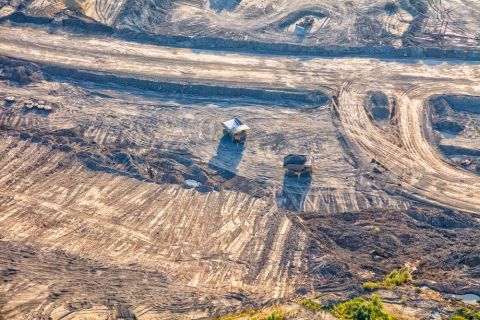The global market flow of energy imports and exports is always in flux, and so the disruption to EU energy supplies following Russia’s invasion of Ukraine “is not something that really concerns us,” said OPEC Secretary General Haitham Al Ghais.
Other international players view it differently. Indeed, many see challenges ahead given “the reality of a war going on at the center of Europe,” said Carlos Pascual, S&P Global Commodity Insights’ senior vice president for geopolitics and international affairs.
The pair discussed the role of OPEC, the relevance of OPEC+ and the reality of the energy “transitions” during a conference spotlight conversation on March 7 during CERAWeek by S&P Global in Houston.
“We all remember April 2020, when WTI prices were negative and the market collapsed due to the pandemic. [OPEC+] stepped in again with humongous production adjustments on nearly 10 million barrels a day, which I would say really actually saved the industry from collapse.” —OPEC Secretary General Haitham Al Ghais
A service organization
OPEC itself operates akin to a “mini” U.N., Al Ghais said. His team of more than 140 represents the cartel’s member nations and 42 nationalities, all working to “promote global market stability” and fulfill the vision established in 1960 by its five founding member countries, he said.
“We always say that the oil that's in our countries under the ground belongs to us, but it actually belongs to you. All of you. All around the world. It belongs to mankind, to humanity,” he said.
Al Ghais said OPEC wants to promote the idea that the cartel preserves its reservoirs via best practices and uses the best technologies to promote the use of oil in a sustainable and environmentally friendly way.
That philosophy was the genesis of OPEC+ during the 2016 downturn, which dictated an agreement among OPEC members and others, including Russia, that was then termed a “Declaration of Cooperation.”
“We all remember April 2020, when WTI prices were negative and the market collapsed due to the pandemic,” he said. “[OPEC+] stepped in again with humongous production adjustments on nearly 10 million barrels a day, which I would say really actually saved the industry from collapse.”
Al Ghais said his vision for OPEC’s role is “something of service to the oil industry” that includes action to preserve an investment-friendly climate and a stable market with less volatility.
How would the world carry on without OPEC+?
Pascual attempted to steer the talk toward the current “tensions in Europe” and the incumbent relevance of OPEC+.
“The tensions within Europe right now are palpable. Within that context, does OPEC+ remain viable?”
Al Ghais redirected.
“Let’s turn it around to another question, which I would say is, ‘How would the world or our industry be without OPEC+?’
“Stop and think and reflect about that. I think the image that would come to mind is something of instability, more volatility. I don’t think that’s something that’s in the interest of producers or consumers or the global economy, and definitely not in the interest of the oil and gas industry. So I think, yes, OPEC+ is critical.”
Al Ghais followed up to “remind everybody” that when the OPEC+ agreement was formed in 2016, few expected the relationship to last.
“We are going strong into our seventh year working together to try and promote stability. So I think it’s become sort of a transparent mechanism and methodology where everybody knows where we meet, what we discuss, when we meet,” he said.
Al Ghais pointed to the group routinely holding a press conference following its meetings to explain its decisions.
“I think it’s critical and it’s important to have OPEC+,” he said.
‘Typical redirection’
Neither speaker addressed whether OPEC+ can remain effective given the general condemnation of Russia’s war on Ukraine and its subsequent weaponization of energy, which has profoundly shaken most of Europe.
“It will certainly be one of those issues that remain a challenge for the international community. I think it’s inevitable that it will be because of the extraordinary nature of what’s happened to the center of Europe and the reality of a war going on at the center of Europe,” he said. “So let’s see what happens.”
What’s happened so far: Europe no longer relies on Russia for the lion’s share of its energy needs.
Pascual said much of Russia’s crude exports are going to China and India, while the Middle East has increased its exports to Europe.
Is that market “switch” – an upending of decades’ worth of continental energy policy and practice – cause for concern? Or, Pascual asked, is it a positive outcome for OPEC?
Al Ghais said OPEC wasn’t really concerned.
“The markets – at least in my 30 years or so of doing this business – [there] have always seen redirection of flows, whether it’s related to geopolitical events or demand centers being created, others disappearing,” Al Ghais said. “This is typical where we have a redirection and flows from the east to the west or the west to the east.”
EU leadership views the shift differently.
Russian President Vladimir Putin’s invasion of Ukraine in February 2022 forced European countries to abandon their high level of dependence on Russia for oil and natural gas. In 2021, Russia was the largest provider of petroleum to the EU with a 25% share; Russia supplied almost half of its natural gas.
The EU’s import of Russian resources has dropped sharply following sanctions and price caps imposed last fall, and other penalties remain on the table.
Before the war, Russia supplied 39% of the EU’s natural gas. That figure is now just 9%.
“The measures that are being taken now are, in many ways, irreversible,” Paula Pinho, director at the European Commission’s Directorate-General Energy, said during a separate March 7 presentation at CERAWeek. “Even if you see in the future—and we do hope so—a fundamental political change in Russia, there are issues that took place over the past year that cannot be reversed so easily.”
“What concerns us more is actually the slowdown we see in Europe and the U.S. financial situation and inflation. We see a kind of a divided market and almost like two markets, one market with promising growth, and the other side with a slowdown.” —Al Ghais
U.S. finances trouble OPEC
More than burgeoning concern over the EU market disruption, Al Ghais said financial matters in the U.S. are of greater interest.
“What concerns us more is actually the slowdown we see in Europe and the U.S. financial situation and inflation,” he said. “We see a kind of a divided market and almost like two markets: one market with promising growth, and the other side with a slowdown.”
In short, the “redirection” of the European market supply is “not really a concern,” Al Ghais said.
“It’s quite normal to see this bounce,” he said. “I mean, let’s remind ourselves that it was expectations in the beginning of the year that Russian crude production would drop by 3 million barrels a day. But Russian production has been resilient and it’s managed to find a new home. It’s not just in … China, and I think also in Turkey.”
Pascual said China and India are paying for commodities at a significant discount to the rest of the world.
“Indeed, one of the factors is obviously there has been a bifurcation in the market in terms of price,” he said. “The revenue flows … that's a little bit of [whether there is a] benefit or not to the countries of the Middle East have had that opportunity to actually redirect their supplies to, frankly higher-prices.”
Al Ghais said that the market is dictated by what buyers are willing to pay.
“OPEC does not get involved in pricing or prices,” he said. “Our NOCs [national oil companies] set their prices on a monthly basis, but this has no relation to OPEC itself or what we do. It’s all supply-demand driven. If there is a demand for oil … and NOCs can afford to apply a higher premium … and the market's willing to accept that, that's what will happen.”
Recommended Reading
CorEnergy Infrastructure to Reorganize in Pre-packaged Bankruptcy
2024-02-26 - CorEnergy, coming off a January sale of its MoGas and Omega pipeline and gathering systems, filed for bankruptcy protect after reaching an agreement with most of its debtors.
NGL Growth Leads Enterprise Product Partners to Strong Fourth Quarter
2024-02-02 - Enterprise Product Partners executives are still waiting to receive final federal approval to go ahead with the company’s Sea Port Terminal Project.
After Megamerger, Canadian Pacific Kansas City Rail Ends 2023 on High
2024-02-02 - After the historic merger of two railways in April, revenues reached CA$3.8B for fourth-quarter 2023.
Enbridge Advances Expansion of Permian’s Gray Oak Pipeline
2024-02-13 - In its fourth-quarter earnings call, Enbridge also said the Mainline pipeline system tolling agreement is awaiting regulatory approval from a Canadian regulatory agency.
Canadian Natural Resources Boosting Production in Oil Sands
2024-03-04 - Canadian Natural Resources will increase its quarterly dividend following record production volumes in the quarter.





